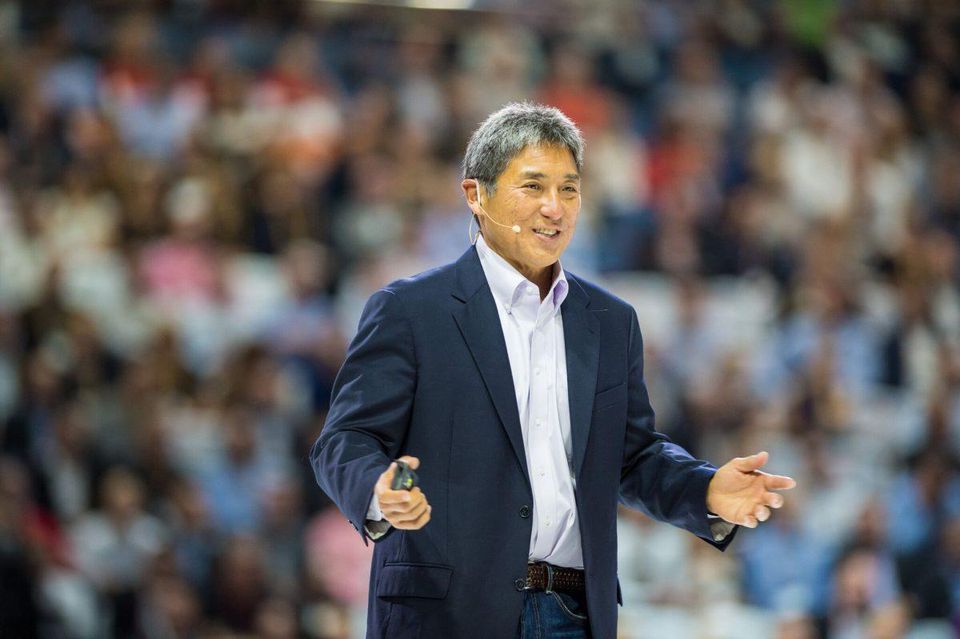Guy Kawasaki has been a renowned figure in the tech world since he was member of Apple’s original Macintosh team in the 1980s. A Silicon Valley icon and widely respected expert in entrepreneurship, venture capital, marketing, business evangelism, and more, he’s shared many keen insights in previous bestselling books such as The Art of the Start and Enchantment. In his new and most personal book, Wise Guy: Lessons from a Life, Kawasaki explores his surprising journey through a series of fascinating vignettes reflecting a wide range of experiences–including the impactful years working with Steve Jobs–that have shaped his career and life. Each story also offers powerful life lessons that we all can learn from.
Kawasaki is now chief evangelist of Canva, an online graphic design tool. He is a brand ambassador for Mercedes-Benz and an executive fellow of the Haas School of Business (UC Berkeley). He was the chief evangelist of Apple and a trustee of the Wikimedia Foundation, and has a B.A. from Stanford University, an M.B.A. from UCLA as well as an honorary doctorate from Babson College.
In our interview, I asked Kawasaki questions that I personally wanted to understand most from his life and work.
Kathy Caprino: Guy, if you had to choose, what would you say is the single most important career lesson you’ve ever learned?
Guy Kawasaki: The single most important career lesson that I learned is that it doesn’t matter how you get a job. What matters is what you do with the job once you have it. And this applies if you get a job through nepotism, connections, etc. as well as if you had the perfect work experience and graduated magna cum laude from Stanford with a 4.0 GPA.
The day after you start, no one who matters will care. You either produce or you don’t. Getting the job is the easy part. Doing the work is the hard part.
Caprino: In your book you mention that you blew up your career at Apple with one sentence. What was it and why was it time to do that?
Kawasaki: That’s an overstatement. In front of the marketing team, Steve told Apple’s ad agency not to leave me with a pre-release copy of the Think Different campaign. I asked him if it was because he didn’t trust me. He said it was. I countered with, “That’s okay. I don’t trust you either.”
I don’t know what got into my head to say that, but it was very satisfying then and still satisfying now.
Caprino: What’s the biggest regret or “mistake” of your professional life that you now teach others to avoid?
Kawasaki: I quit Apple twice. I turned Steve down for a third job. Turned down Sequoia Capital for a chance to be the CEO of Yahoo!. Those add up to about $3 billion. Easy come, easy go.
The only practical wisdom to garner from these mistakes is that constantly jumping from green-looking pasture to greener-looking pasture might not be optimal. It can be better to stay in the same pasture and make it greener.
Caprino: From your view, what do you see occurring in terms of women and tech today and the #MeToo movement and how can men and women both support the advancement of women in STEM and tech (and why is that important)?
Kawasaki: The sexist and misogynist attitudes that still exist today absolutely befuddle me. It is so hard to find and keep good people. I don’t understand why a company would reduce the talent pool that they can tap.
This is something that Steve Jobs was also way ahead of his time on. Many of his direct reports in the Macintosh Division were women. He didn’t care about gender, race, religion, or sexual orientation. All he cared about was competence.
That’s what people should copy from Steve Jobs, not the other superficial stuff.
Caprino: In your view, what place do morals, ethics and values hold in our ability to build a rewarding career of significance and make important contributions throughout our lives?
Kawasaki: The high road doesn’t have much traffic on it. There is a hard and fast line between moral/ethical behavior and immoral/unethical behavior. I can’t tell you that I have empirical, scientific proof that it’s the way to go—since there are so many rich and successful people of dubious character. But it’s a path that one can choose and still succeed.
Caprino: In all your years at work, what have you seen to be the one most important business skill and how can we hone that skill?
Kawasaki: The most important business skill is the ability to effectively communicate. Less is always more.
Caprino: Any final words about building a life and career that will satisfy you?
Kawasaki: Stop reading interviews and seeking inspiration and get to work.
For more information, check out Wise Guy: Lessons from a Life.
To build a more satisfying career, visit KathyCaprino.com and tune into her weekly podcast Finding Brave.
